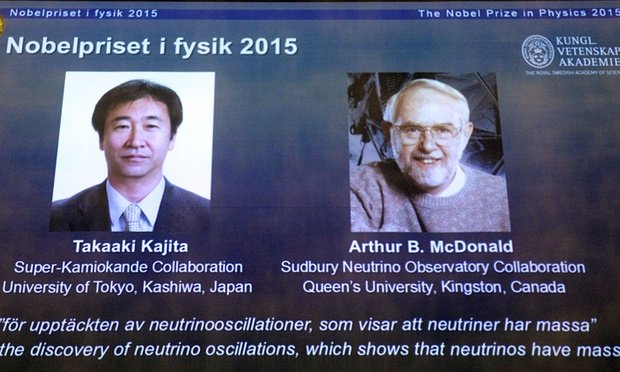This year’s Nobel Prize in Physics was awarded jointly to Japanese Takaaki Kajita and Canadian Arthur B. McDonald “for the discovery of neutrino oscillations, which shows that neutrinos have mass”.
Neutrinos are ubiquitous subatomic particles with almost no mass and which rarely interact with anything else, making them very difficult to study.
Takaaki Kajita and Arthur McDonald led two teams which made key observations of the particles inside big underground instruments in Japan and Canada.
They were named on October 6 at a news conference in Stockholm, Sweden.
Goran Hansson, secretary general of the Royal Swedish Academy of Sciences, which decides on the award, declared: “This year’s prize is about changes of identity among some of the most abundant inhabitants of the Universe.”
Prof. Arthur McDonald is a professor of particle physics at Queen’s University in Kingston, Canada. He said hearing the news was “a very daunting experience”.
“Fortunately, I have many colleagues as well, who share this prize with me,” he added.
“[It’s] a tremendous amount of work that they have done to accomplish this measurement.
“We have been able to add to the world’s knowledge at a very fundamental level.”
Prof. Takaaki Kajita, from the University of Tokyo, described the win as “kind of unbelievable”. He said he thought his work was important because it had contradicted previous assumptions.
“I think the significance is – clearly there is physics that is beyond the Standard Model.”
In the late 1990s, physicists were faced with a mystery: all their Earth-based detectors were picking out far fewer neutrinos than theoretical models predicted – based on how many should be produced by distant nuclear reactions, from our own Sun to far-flung supernovas.

Those detectors mostly entail huge volumes of fluid, buried deep underground to avoid interference. When such a vast space is littered with light detectors, neutrinos can be glimpsed because of the tiny flashes of light that occur when they – very occasionally – bump into an atom.
They include the Super-Kamiokande detector beneath Japan’s Mount Kamioka, where Prof. Takaaki Kajita still works, and the Sudbury Neutrino Observatory in Ontario, Canada, run by Prof. Arthur McDonald. Both are housed in disused mines.
In 1998, Prof. Takaaki Kajita’s team reported that neutrinos they had caught, bouncing out of collisions in the Earth’s atmosphere, had switched identity: they were a different “flavor” from what those collisions must have released.
Then in 2001, the group led by Prof. Arthur McDonald announced that the neutrinos they were detecting in Ontario, which started out in the Sun, had also “flipped” from their expected identity.
This discovery of the particle’s wobbly flavors had crucial implications. It explained why neutrino detections had not matched the predicted quantities – and it meant that the baffling particles must have a mass.
This contradicted the Standard Model of particle physics and changed calculations about the nature of the Universe, including its eternal expansion.
Prof. Olga Botner, a member of the prize committee from Uppsala University, said although the work was done by huge teams of physicists, the prize went to two of the field’s pioneers.
She said Prof. Arthur McDonald had proposed and overseen the building of the Sudbury observatory in the 1980s, and been its director since 1990.
“He has been the organizational and intellectual leader of this venture.”
Prof. Takaaki Kajita, meanwhile, did his PhD research at Kamiokande and then led the atmospheric neutrino group, “trying to make sense of the data they were getting” in the late 1990s.
The total number of Nobel physics laureates recognized since 1901 is now 201, including only two women.
The Royal Swedish Academy of Sciences also decides on the chemistry Nobel – announced tomorrow.
The first of the 2015 Nobel Prizes, for physiology or medicine, was awarded on Monday by the Nobel Assembly at Karolinska Institutet. It was shared by researchers who developed pioneering drugs against parasitic diseases.
